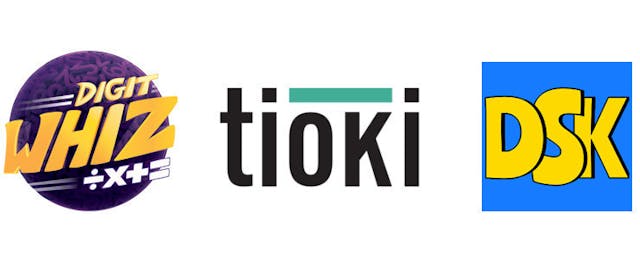On Friday, October 26, the third cohort of eleven startups in Imagine K12's program presented onstage to investors and media for Demo Day, the culmination of their fast-paced, three-month journey through the edtech incubator program. In our ongoing series this week, we'll take a look at each company and see what they're all about. (You can see our profiles of EdCanvas and Secur.ly here.)
Co-founder Kasey Brown spent 19 years as a math teacher and intervention coach before launching this startup in 2009 with web and games developer, Elliot Feinberg. Her experience taught her that kids’ math difficulties began around fourth grade and continue into algebra. Digit Whiz aims to address this by helping students develop strong foundational math skills early on.
How does it work? The platform, available online and on the iPad, offers a suite of math games that cover topics from addition through pre-algebra. The founders say its target audience are students from the 3rd to 7th grade. Upon logging in, educators can upload a csv file to create accounts for every student in the class. (They can also enter it manually.) Every student takes a placement test; based on the results, they are assigned to play a set of games that provide practice for those skills. (Each game is specifically designed around a particular math topic.)
Who’s using It? Over 6,000 teachers and students across 300 schools in 43 states and seven countries have used the program, often for around 30 minutes a day, one to two times a week. Students have used the program away from normal school hours.
Competition: Digit Whiz finds itself in a crowded market for online, game-based math curricula ranging from Motion Math (which is supplemental) to Dreambox (which offers a full curriculum).
Business model: The program is currently free for teachers and parents, but Brown is considering a freemium model as more features and content are added.
Brian Martinez, who worked in public accounting and was previously involved in another startup, met teacher Mandela Schumacher-Hodge through a mutual friend in Teach for America. Their first idea--originally called DemoLesson--revolved around the problem of hiring teachers. Through their experience at Imagine K12, the team broadened its approach. "Finding a job is only part of a teacher,” says Martinez. Tioki, he says, is a LinkedIn tailored for educators who want to brand and establish their expertise, interests, and connections.
How does it work: After signing up on the Tioki homepage, users immediately fill out a profile which includes personal information--including their location, current job, and a set of skills and expertise. Users can list education and work history, credentials, publications, and awards. They can also show off which tech tools they’re using. And similar to LinkedIn, they can award each other skill points. Users can find new connections based on email, school, and skills, along with jobs, events, and a discussion board. Schools can also list jobs.
Who’s using it? Tioki currently has over 4,000 teachers in 28 countries. Martinez estimates 350 users found teaching jobs last year through the site.
Competition: Existing social networks including LinkedIn; frequently-visited job sites like Craigslist and Monster.com; according to Martinez. (Other social networks for teachers, such as Ning groups, Edmodo and others, don't include employment information.)
Business model: The network is free for teachers. Based on responses from schools that have expressed interest to using Tioki to find teachers, the company is considering a recruitment model where schools pay to list jobs.
John Coogan and David Renteln, buddies from childhood days in sunny Pasadena, Calif., originally wanted to build a platform to crunch data from educational games. Shortly after joining Imagine K12, however, they found out that the most education games don't track usage data at all, or provide inconsistent data that can't be compared and aggregated in meaningful ways. So they came up with the Drop Some Knowledge (DSK) app, a social study tool where people can compete with one another on quizzes.
How Does It Work? Think "Words with Friends" applied to classroom learning: Anyone with a Facebook account can access the DSK app. Once there, players can find a Facebook friend, choose a subject, and select a game that consists of ten questions related to that topic. Questions can be uploaded by users themselves and shared with the public. The two players then answer the questions at their own pace and compare the results afterwards.
Who’s using It: Since the pivot required them to rethink and redesign the product, the team released the app just a few weeks prior to Demo Day. A couple of weeks later, they reported 800 teachers around the country have used it, including many Teach for America corp members.
Competition:The company is first targeting the test prep market. Coogan says that other companies like Grockit have test prep programs that offer a competitive element, but unlike DSK don’t usually tap into existing social networks like Facebook. Root-1’s OpenMinds platform is similar in allowing for user-generated question items to be remixed into quiz apps, but DSK is focused solely on being a straightforward question-and-answer style game and currently doesn’t allow for 3rd party developers to pull and mix the content into games or other kinds of programs.
Business model: The app is currently free, but the company plans to host education-related ads and freemium content in the future.


